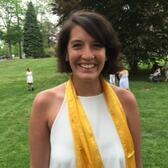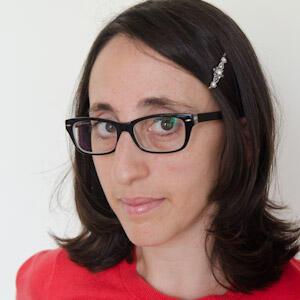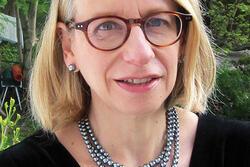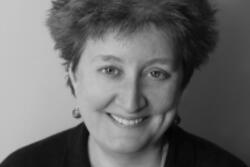An Interview with "White Walls" Author Judy Batalion
A scholar, writer, and comedian, Judy Batalion has a knack for finding the humor in family. As the daughter and granddaughter of Holocaust survivors, Batalion grew up in Montreal with her parents, a younger brother, and a house that was overflowing and chaotic with the results of her mother’s aggressive collecting. With insight and kindness, Batalion's book traces her messy origins, the complicated relationship between being a daughter and mother, and how to live with humor and authenticity in the world, and within our families. We were lucky enough to discuss the release of White Walls with Judy during her ongoing tour.
As someone who loves order, and has a very busy and full life, could you describe your writing process?
My writing process is disordered and chaotic! I may be a militant minimalist in my clean, geometric home, but my desktops (computer and literal) look like warzones and I keep all old material. I draft and redraft the same sections dozens of times. I rarely see white, blank pages. I usually write double the amount that I need – quickly, like a purge – and most of my time is spent editing, in cutting it down. I see writing to be like sculpture. I have this “stone” – a morass of material – and I need to carve out the story from it.
Your experiences have been so varied, how did motherhood become the locus of White Walls?
Though I’d been doing life writing for many years as a comic, performance artist and essayist, I started working on this specific book project in 2011, soon after finding out that I was pregnant. At first, I tried to write this story as fiction, and focused in particular on the “love story” element. But I found it difficult to write about something so close – and for which I had so much real life material – in a fictional way; it felt contrived. So I switched to memoir and structured my outline around the idea of “home.” The arc was driven by my search for comfort and belonging (geographic, professional, social, self) and my pregnancy was just a short prologue and epilogue – it was the catalyst for revisiting my youth and experience. But as I worked on the project, in particular with a teacher and then an agent and editor, it became clear that the mother-daughter story was the most universal and compelling strand. (Also, my daughter was growing up, so I had more to say about the motherhood experience.) It dawned on me that though I’d read amazing memoirs about complicated parents, and others about parenting, I hadn’t read a memoir that put them together, that considered the generational translation of love, of how you can go from having a dysfunctional childhood to being a functional mother (or at least, trying). So I wrote what I’d longed to read; I wrote what was missing.
When writing about an early relationship, with Evan, he comments on your inability to cook and you chalk it up to third-wave feminism. Then, you write, “My domestic deficiencies made me feel like less of a woman, not more of a feminist.” Would you mind expanding upon that distinction a little bit more? How has becoming a mother impacted both your identities as a woman and as a feminist?
I suppose in that particular sentence, I’m referring to the times I’ve hid behind “feminism” to justify behaviors that were not about equality but about my own fears and deficiencies. It’s not that I didn’t cook because of some strong feminist stance, but because I never taught myself to feel comfort at home, to nurture myself and others in certain basic ways. Similarly, I think I’ve sometimes confused “feminist” behaviors in my relationship with men (i.e. being in charge, calling them first, asking them out) with my own fears about losing control of situations that frightened me.
I think just growing up has made me much more of a pragmatist, and less of an idealist, in all ways. Motherhood surprised me too: it turns out, I like my daughter’s uber-feminine side. She loves dolls and high heels and make-up – this should bother me! Intellectually, it irks, but emotionally, I don’t mind. I never got “feminine” education from my own mom, so perhaps I crave that connection. I want her to enjoy her passions, to let her go through her phases.
While your brother Eli is definitely a part of your story, it is a story about navigating motherhood and daughterhood while establishing personhood. In your opinion, were the standards for sons and daughters different growing up? How did gender roles and expectations affect your relationship with your mother and your father?
I once read a bit by an author (I wish I could remember whom!) who said something to the effect that she was raised as if it was the 1990s, and her brother was raised as if it was the 1950s. She meant that she was educated, given opportunities, told to make a career, but her brother was still treated as if he was “special.” The evolution of gender roles won’t work, she argued, unless both genders can adapt. I do recall as a child being told to be quiet about my tastes so that my opinions wouldn’t influence my brother’s tastes. I felt resentful about that, and very jealous of how my parents hyper-celebrated his accomplishments. But now that I have 2 kids, I see that perhaps all that was less about gender and more about birth order and personality. (Eli is younger than me.) I must say, I often feel relieved to have two daughters – I think I’d be scared to raise a boy. Masculinity is so complicated!
I think a lot about Freud’s unfashionable theories about how women are “stuck” in unproductive ambivalent relationships because they never fully separate from their mothers (because we are like them). My husband’s mom was also a hoarder, but he did not react to it with the same intensity and shame. There are differences – she’s not as extreme as my mother – but still. While I spent decades hiding my childhood home and projecting it on to my body, he made jokes about it, gave me a tour, showed me the stashes of kosher frozen turkeys. He was not as attached to his mother’s home as I was, or at least, not in the way I was. This could be due to gender. Or maybe just personality.
At the end of the book, you write that “the act of writing memoir is an act of cleaning up.” As your book reaches a wider and wider variety of audiences, the possibility for mess seems to be inherent. How have you found navigating the uncontrollability of publishing a book like White Walls?
Ha! This is a great question, and a difficult one because I’m still living it. The book just came out last month, so the experience of being a published memoirist is new and I haven’t had a chance to reflect on it with any real distance, but I do like how you mention the uncontrollability and mess. That certainly hits a note with me. As I’m starting to see now, part of me wanted to write this book in order to “get over it.” I had a need to clean up, construct a life narrative that explained (to myself) and created value out of years of anxiety and confusion, out of hazy, complicated family relationships. I did feel like the act of writing, editing and finessing my memories provided some degree of closure.
But since the book has been out, I’ve had all these new experiences, conversations and insights. Family members have offered alternate takes on scenes and the reasons behind behaviors. I’m filming a segment for the Today Show which includes a conversation with my mother about her hoarding – I’d never before talked to her about it head on! I’ve been invited to speak to firemen and housing authority workers – people who deal with mental illness from such a different stance to mine. Also, as I age and grow as a person (not just a writer), I am constantly hit with new ideas. I want to go back and rewrite whole chapters! Writing and life are so intertwined for me, and memory is so iterative. I’d hoped to move on to other projects but fear I never will!
While attending Harvard, you mention that it was the first time being around “people who were not Jewish at all, people who did not have families who survived the Holocaust . . . people who would never assume a refugee background as a normal backstory.” As your daughters grow and become more aware of their history, what kinds of conversations are you anticipating? How do you currently verbalize your family’s history and traditions?
Ah yes. My daughters are one and four, so I’m just entering these dangerous, murky waters . . . Here’s an anecdote that might begin to illustrate my experience. Several distant relatives (and our cat) passed away last year. I found it incredibly hard to talk to Zelda about death. While I generally extol honesty uber alles, I was terrified and avoided telling her the truth. A wise mentor pointed out that this was likely a relic of my Holocaust lineage – death for my family was so horrific and hidden and underlying everything. My mother avoided telling me that her best friend died because she feared it would be too difficult for me to handle (I was 23 at the time). Everything was so fragile. My mentor advised me to be as blunt as possible, to just say: “Great-grannie Sarah died. Her body was very old and sick and it stopped working. She is buried in the ground.” I was more nervous for this conversation than for a stand-up gig. But I rehearsed and said these lines to Zelda, and she was like, “OK.” Maybe that’s how we correct for generational trauma. (Then again, I can picture Zelda in 20 years telling her friends how crazy I was for being so blunt and blasé about a dying relation, for forcing her to wave goodbye to our cat before the lethal injection.)
As you continue to build your craft and give voice to your experience, did you draw on any specific Jewish women as professional or personal role models?
Sometimes I think that if friends are the family you choose for yourself, mentors are the mothers I’ve chosen for myself. Now that you ask, it dawns on me that many (perhaps most?) of my writing teachers and guides are Jewish women, a number of whom have children too. This was always an issue for me during my years in academia – NONE of my female advisors had children, and though I myself was ambivalent about procreating back in my 20s, I was very aware that I had no models for how to be an academic and have a family. That made it seem impossible.








